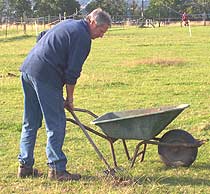Worming Your Horse - Avoid Resistance to Equine Wormers
There is currently an overuse of horse wormers (anthelmintics) in the equine world.
Over 90% of worms that affect are in just10% of the horse and pony population, and the unnecessary doasge of equine wormers on horses is now causing drug resistance.
There is already widespread cyathostome (redworm) resistance to the drug Fenbendazole.
Resistance to dosage with Pyrantel has been seen and now preliminary warning signs of equine resistance to doses of ivermectin and moxidectin are also now present.
At present there are no new horse worming products being developed by pharmaceutical companies.
This means that once there is resistance to the current horse wormng products that are available there will be no effective treatment for those horses that do have a worm burden.
FAECAL WORM EGG COUNTS (FWEC)
To help to avoidresistance to horse wormers the ideal protocol, or worming program, is to do regular faecal worm egg counts [FWECJ - some horse owners refer to these as "worm counts".
A faecal sample taken from a horse is microscopically analysed for worm eggs and the number ofworm eggs present in the sample are recorded.

The horse is then dosed with a wormer based on this.
However most samples have nil to extremely low counts of egg numbers and worming the horse is not usually necessary.
Initially it is best to have a worm egg count done for each horse every 3 months.
Provided egg numbers remain low, then after the 1st year that interval between worm egg counts can be increased to once every 4 months.
A disadvantage of a having worm egg count is that it is not reliable for the analysis of tapeworm eggs in horses. Therefore it is recommeded that a tapeworm wormer is included your horse or pony's worming regime, this can be done every 6 — 12 months.
Alternatively a blood sample may be taken from you horse or pony to assess if a horse or pony has tapeworms
MANAGEMENT OF HORSES AND PASTURE TO REDUCE WORM COUNTS
Alongside the worm egg count programme, it is important that other horse and pasture management practices are put in place:
- Regularly remove droppings from fields - at least twice weekly is best.
- Avoid overgrazing fields where horses are turned out
- Rest grazing from horses for 6 months at a time - the pasture can be rotated for grazing with sheep or cattle.
- Keep horses and ponies with a high worm egg count separate from those with a low worm egg count
- Turn out horses of a similar age together
- Harrow fields where horses are grazing in summer - this breaks up droppings and scatters the worm larvae.
HORSE CARE ADVICE AND EQUESTRIAN ARTICLES
How to Treat Mud Fever in Horse | Symptoms of Colic in Horses | Horse Insurance Advice | Salt Blocks for Horses | Arthritis Supplements for Horse | Horse Sarcoids | Feeding an Overweight Horse |Supplements for Veteran Horses | Benefits of Glucosamine Supplements for Horses | Horse Feed Storage | Acorn Poisoning | Worming Your Horse - Avoid Resistance to Equine Wormers
by using a worming
program that includes worm egg counts and pasture management